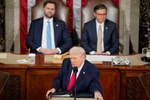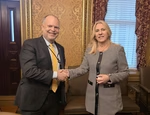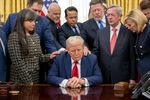Theresa May's Brexit deal overwhelmingly crushed by lawmakers for second time

British lawmakers overwhelmingly rejected Prime Minister Theresa May's Brexit deal for a second time, plunging the UK into a further period of political uncertainty with the departure date from the European Union a mere 17 days away.
Despite May's hoarse-voiced pleas in the House of Commons for lawmakers to support her draft exit deal on Tuesday, or run the risk of a chaotic exit from the EU or no Brexit at all, lawmakers crushed it by 391 votes to 242.
The margin of defeat was less than the historic loss suffered by the government when the deal was originally voted on in January.
May had hoped that changes to her deal agreed last minute on Monday night with the EU would get it across the line.
Speaking in the House of Commons after the defeat, the Prime Minister told lawmakers she "profoundly regrets" the vote against her deal. "The deal we have negotiated is the best and indeed the only deal available."
May has offered her MPs a free vote on Wednesday on whether the UK should leave the EU without a deal on March 29.
If a no deal is rejected, the House of Commons will vote on an extension to the March 29 withdrawal date.
"This House will have to answer that question. Does it wish to revoke Article 50? Does it want to hold a second referendum? Or does it want to leave with a deal but not this deal?
"These are unenviable choices, but thanks to the decision the House has made this evening they must now be faced," she said.
No deal looms
But EU officials have warned that rejecting May's withdrawal agreement has raised the stakes for a hard Brexit.
"With only 17 days left to 29 March, today's vote has significantly increased the likelihood of a 'no-deal' Brexit," the spokesman for European Council President Donald Tusk told CNN.
"We will continue our no-deal preparations and ensure that we will be ready if such a scenario arises."
Another possible outcome could be a second referendum, which has been called for by a minority of lawmakers from all parties.
But opposition Labour leader, and long-standing eurosceptic, Jeremy Corbyn did not push for another Brexit referendum in his address to the Commons on Tuesday, despite his party's official position of backing a second vote on the issue.
Nor is there any majority in Commons for any specific kind of Brexit – let alone a second referendum.
May's withdrawal deal crumbled due to a contentious guarantee, known as the Irish backstop, to prevent a hard border in Northern Ireland by keeping customs arrangements between the UK and Ireland aligned.
The backstop has been a bone of contention with many British eurosceptic lawmakers, who feared it would indefinitely bind the UK closer to the EU's rules.
The Prime Minister's attempt to gain concessions from Brussels over the backstop led to the last minute dash to Strasbourg on Monday -- where she secured changes to her deal.
But hopes to swing the tide of dissent to her deal suffered a blow by the UK Attorney General Geoffrey Cox, who said the risk of the UK being trapped in the backstop remained unchanged.
His opinion was followed by the pound dropping sharply on Tuesday; and likely influenced eurosceptic lawmakers who were mulling on how to vote later in the day.
Hours before the vote, the 10 lawmakers from Northern Ireland's Democratic Unionist Party [DUP], which props up May's minority government, announced that it would not back May's deal.
Kakvo je tvoje mišljenje o ovome?
Učestvuj u diskusiji ili pročitaj komentare





 Srbija
Srbija
 Hrvatska
Hrvatska
 Slovenija
Slovenija



























































